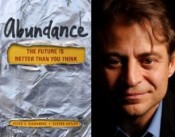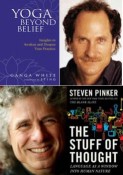Free Forum Q&A – PETER DIAMANDIS Chairman, X PRIZE Foundation author, ABUNDANCE: The Future Is Better Than You Think
Written on June 5th, 2015
Originally aired March 2012
Opening day of the 2012 TED conference featured two talks one after the other. The first by Paul Gilding entitled The Earth is Full asked questions like, Have we used up all our resources? Have we filled up all the livable space on Earth? Gilding suggests we have – with the possibility of devastating consequences. In a talk that’s equal parts terrifying and oddly hopeful, he says, “It takes a good crisis to get us going. When we feel fear and we fear loss we are capable of quite extraordinary things.”
That talk was followed by one by this week’s guest, PETER DIAMANDIS, entitled ABUNDANCE IS OUR FUTURE, in which he makes the case for optimism – that we’ll invent, innovate and create ways to solve the challenges that loom over us. “I’m not saying we don’t have our set of problems — climate crisis, species extinction, water and energy shortages – we surely do. But ultimately, we knock them down.”
Since the dawn of humanity, a privileged few have lived in stark contrast to the majority. Conventional wisdom says this gap cannot be closed. But, according to a book by Diamandis and co-author Steven Kotler, it is closing – fast. ABUNDANCE – THE FUTURE IS BETTER THAN YOU THINK documents how progress in artificial intelligence, robotics, infinite computing, ubiquitous broadband networks, digital manufacturing, nanomaterials, synthetic biology, and many other exponentially growing technologies will enable us to make greater gains in the next two decades than we have in the previous two hundred years. They believe we will soon have the ability to meet and exceed the basic needs of every man, woman, and child on the planet.
Free Forum Q&A – GANGA WHITE, YOGA BEYOOND BELIEF: Insights to Awaken and Deepen Your Practice & STEVEN PINKER, THE STUFF OF THOUGHT: Language as a Window into Human Nature
Written on March 20th, 2015
Ganga White (originally aired: July 2007)
Steven Pinker (originally aired: October 2007)
I’ve been practicing yoga since 1970, obviously long before it was a major cultural phenomenon. GANGA WHITE started a few years earlier. YOGA BEYOND BELIEF: Insights to Awaken and Deepen Your Practice speaks to the way I’ve thought about yoga. It’s about paying attention, lifelong learning, and discovering our own paths to growth, integration and presence. It talks about living life as a meditation – but not in the navel-gazing or guru-following way many may think about meditation. It also takes issue with many in the yoga world today who tend to make it a rigid strictly codified authoritarian practice. Why does the FCC get so riled up about salty language? How do lobbyists bribe politicians? Why do romantic comedies get such mileage out of the ambiguities of dating? And why is bulk email called spam? These are some of the everyday questions STEVEN PINKER tackles in THE STUFF OF THOUGHT: Language as a Window into Human Nature. We know language helps us communicate, but what can words tell us about ourselves? Harvard professor and two-time Pulitzer Prize finalist, PINKER explores how language illuminates the mind.
Q&A: LESTER BROWN – FULL PLANET, EMPTY PLATES
Written on December 25th, 2014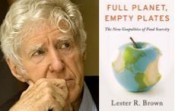 |
Aired: 12/23/12
Recorded: 10/17/12
When gas prices were at or near record highs a few months ago in the US, that got people’s attention. What about food prices? Have you noticed them rising? Are you making different choices in the supermarket? If not, it might be because of two things.
One, in America so much of our food is processed, packaged and marketed, that raw commodity prices make up only a fraction of the price of the food we buy. In other countries, especially the less developed ones, an increase in the price of rice or corn can have a major effect on how much a family can afford to eat. Two, Americans spend only 9% percent of their income on food, while millions around the world spend 50-70%. Millions of households now routinely schedule foodless days each week-days when they will not eat at all. A recent survey by Save the Children shows that 14% of families in Peru now have foodless days. India, 24%. Nigeria, 27%.
In his newest book, FULL PLANET, EMPTY PLATES, LESTER BROWN writes,
“The U.S. Great Drought of 2012 has raised corn prices to the highest level in history. The world price of food, which has already doubled over the last decade, is slated to climb higher, ushering in a new wave of food unrest. This year’s corn crop shortfall will accelerate the transition from the era of abundance and surpluses to an era of chronic scarcity. As food prices climb, the worldwide competition for control of land and water is intensifying. In this new world, access to food is replacing access to oil as an overriding concern of governments. Food is the new oil, land is the new gold. Welcome to the new geopolitics of food.”
www.earth-policy.org
Q&A: Gil Friend, President & CEO of Natural Logic Inc
Written on November 5th, 2014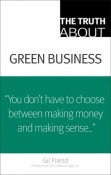 |
Q&A: Frances Moore Lappé, Author – ECOMIND: CHANGING THE WAY WE THINK, TO CREATE THE WORLD WE WANT
Written on October 2nd, 2014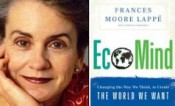 |
Aired: 9/8/13
Originally Aired: 12/30/12
Where do you think the most important changes need to take place to turn things around in terms of big issues like the economy, the environment, and social justice?
Some might say climate change is the critical global issue so it must be clean energy. Others might say nothing will make as much difference for the world’s people as educating and empowering girls and women. Closer to home, a case can be made that public financing of political campaigns would have the most impact on all such issues by making it possible for the power of the United States to become a greater force for good.
All good answers, but this week’s guest gives another answer – and its one that I share. Frances Moore Lappe, who has herself been a force for good at least since the publication of the phenomenal best-seller Diet for a Small Planet in 1971, says that the greatest impact would follow from changing our minds.
In her 18th book, ECOMIND: CHANGING THE WAY WE THINK, TO CREATE THE WORLD WE WANT, Lappé argues that much of what is wrong with the world, from eroding soil to eroding democracies, results from ways of thinking that are out of sync with human nature and nature’s rhythms. Humans are doers, she says. But our capacity for doing is undermined by seven “thought traps” that leave us mired in fear, guilt, and despair — none of which are motivators to action.
Drawing on the latest research in climate studies, anthropology, and neuroscience, she weaves her analysis together with stories of real people the world over, who, having shifted some basic thought patterns, now shift the balance of power in our world. Chapter-by-chapter, Lappé takes us from “thought trap” to “thought leap,” and with each shift, challenges become opportunities.

